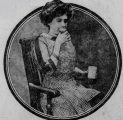When I was a boy of twelve or thirteen my father, who was a man of books, pointed one day to the ten volumes of “Gibbon’s Rome” that stood on the library shelf, and told me I ought to read them. He had a way of suggesting a thing that made me want to do it.
The first result was what might have been expected. I was baffled, unhorsed, as Don Quixote when he attacked the windmill. I could understand it very little and liked it not at all. The mass of facts was appalling, the style was ponderous. I was a little lad trying to walk with a giant.
I said to my father, “Dad, this is fierce!” I showed him one sentence that was a page and a half long. Before I got to the end of it I had forgotten the begining.He answered only, “Keep on!” I kept on. It was hard, dull work.


And then, along about the thirteenth chapter, I think it was—it happened! Something took place inside of me. It was as if I had been “converted.” I found myself suddenly liking what I read. The language, which had been tedious and involved, all at once grew beautiful. I had caught step with Gibbon’s majestic style. I had followed him persistently, and at last he had rewarded me by casting his mantle upon me.
The walls of Jericho fell down. I understood. I loved. I was converted. I count that one of the great moments of my life, for then a whole area of enjoyment was added to my possessions.
My life was permanently enlarged. Spiritually speaking, I had struck oil.
Frank Crane, 1920
